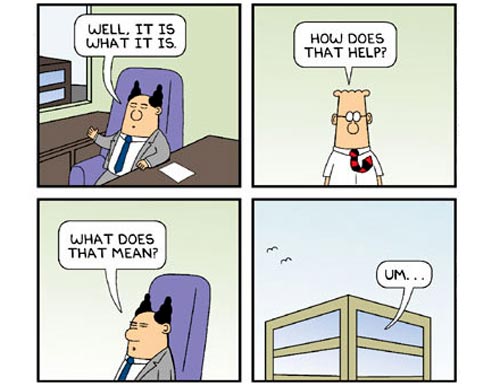callan \ blog
| "don't take it home with you"
august 21, 2016
As I'd guess is the case for most people, the first few jobs I ever had were pretty terrible. Once on the same day at the big commercial bakery I worked for during high school, I managed to get hit in the face with a frozen pie and to have one of the proprietors throw a fly-infested pie from the sales floor at me. A few years later, I quit a work study position in college because I was told my exhalations of breath sounded too much like sighing. I remember the victoriousness I felt as I biked away from that office, giving the ol' one-finger salute until it was out of sight, and the dread that caught up with me by the time I turned onto my street. I had nothing else lined up, and rent was due later that week.
I wound up filling an open slot at the school's writing center, and it didn't hurt that rent back then was about a fifth of what I'm paying today. But I was without a parachute for a little while there. I wondered if there was something wrong with me, if I was in fact an insubordinate slacker with an attitude problem. I thought a lot about the impact that would have on my future employability. The business with the sighing really ate away at me, in part because it was so nonsensical and in part because I began fearing I was committing any number of other undesirable, unconscious acts that were opaque to me. My tone of voice, my resting bitchface, my gestures, my sense of humor - nothing was safe from scrutiny. This royally screwed up my confidence and sense of self, and there wasn't much to stop me from picking at the wound.
I've grown quite a bit since those days and realize now that these weren't much more than a few unfortunately-timed hiccups along the way to adulthood. But I've been thinking a lot about the number one piece of advice I think we millennials must be tired of hearing by now, that we shouldn't take work stuff "home" with us. Not in the homework/working-from-home sense, but in the "interpersonal conflict that's still simmering and upsetting you once you've left for the day" sense. All I have to say to that is... well, easier said than done.
Now, I'm certainly not advocating for people to be upset about work-related issues after working hours. But I think it's especially difficult for younger, less experienced employees to step out of the office and immediately turn off any lingering thought processes that pertain to the workday's conflicts or stress. It's hard to let things roll off you when you've only had a few years to practice that. I'd be willing to bet that most of the people who say "don't take it home" were similarly bad at doing so ten or twenty years ago. And there are many reasons why it's so tough.
First and foremost, I'd say, is precarity. For people who are in their first or second *~real job~* after spending years cobbling together hours at a handful of part-time positions, or half-working/half-going to school, or flitting around from temp job to temp job, it's a big deal if and when you finally find stability. You're going to tend to be more invested, in terms of both work ethic and emotions, when you land a position that comes with blessed security. And you're going to worry more about the repercussions of losing that stability once you've found it. So, if some conflict or unresolved issue rears its head in the workplace, you're going to have concerns that cut to the very core of your panic about whether or not you can pay your bills this month. Especially when you live in a place with Boston-sized costs of living.
And then there's the issue of professional development and commitment, and the fact that some people are relentlessly passionate about what they do and have a hard time switching off. How can you not "take it home" when you have no time to finish your presentation slides or your trade magazine article at work? Not to mention traveling to conferences, networking events, and one-off talks. And some workers in some fields feel like what they do is who they are. The personal is professional, as somebody once wrote.
Also, people who want to grow on the job, either by taking on more responsibilities or getting promoted, feel frustrated by lingering conflicts, bottlenecks, or communication breakdowns. They might see one bad meeting as a sign that they won't be considered for that new position, or that a necessary ally in implementing change is suddenly no longer on board. It's tough to deal when you feel you have the drive required to do something more or something new, but it's not being acknowledged or nurtured. Even though one lousy interaction doesn't always mean that's the case, negative memories outweigh positive ones; it's just human nature. It can be tough to brush yourself off when you get knocked down unexpectedly, and it can discourage you from trying to climb the ladder or push the envelope.
So, to all you managers of millennials out there, consider you're suggesting we do something that doesn't yet come naturally to most of us. We need a few more notches in our belts, and we need more time feeling safe in the knowledge that the rug's (fingers crossed) not getting ripped out from under us anytime soon. And to fellow members of my generational cohort, do try to relax and give yourself plenty of that sweet, sweet "me time," particularly when the going gets tough at work. We do often need to chill and put things in perspective. A more open, direct dialog about on-the-job problems, conflicts, and misgivings between supervisor and supervisee helps both sides not "take it home."

Basically.